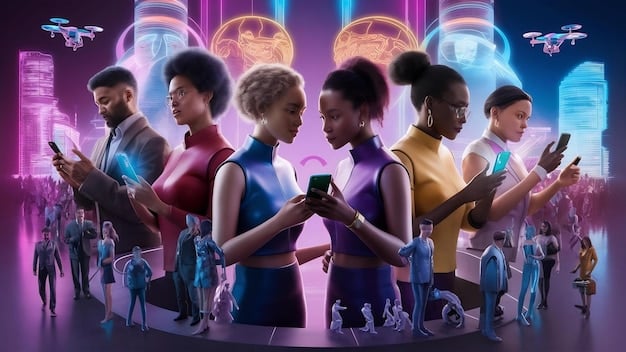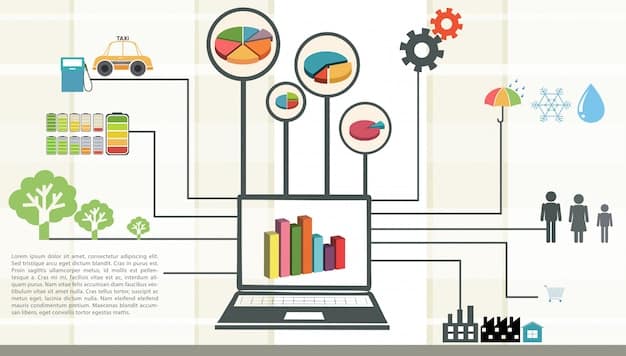Facebook’s Group Updates: Building Communities in the US 2025

Facebook’s latest group updates for 2025 in the US focus on enhancing administrative tools, fostering authentic connections through AI-powered moderation, and providing new monetization avenues, aiming to strengthen community building and member engagement.
As we navigate the ever-evolving landscape of digital interaction,
The Evolution of Facebook Groups: A Retrospective
Facebook Groups have long been a cornerstone of online community building, evolving significantly from simple discussion forums to sophisticated platforms. Their journey reflects broader trends in social media, prioritizing connection and shared interests. Tracing their genesis reveals a continuous adaptation to user needs and technological advancements, impacting how individuals and organizations foster their digital presence.
Initially designed to facilitate intimate discussions among smaller circles, these groups have expanded their utility. They now cater to diverse purposes, ranging from local neighborhood watch programs to global interest groups and professional networks. This expansion underscores Facebook’s ambition to be more than just a social network but a vital infrastructure for intricate online communities.
From Humble Beginnings to Community Hubs
In their formative years, Facebook Groups were relatively basic, offering rudimentary features for sharing posts and comments. However, as the platform matured, so did the functionalities available to group administrators and members. This growth trajectory aligns with the increasing recognition of community as a core tenet of online engagement.
- Early features focused on simple discussion and file sharing.
- Introduction of advanced moderation tools and member management.
- Integration of multimedia options, live video, and events.
The strategic enhancements over the years were not coincidental; they were a direct response to the escalating demand for more robust and versatile community management solutions. This focus allowed groups to become vital hubs for shared passions and collective action.
Adapting to Modern User Behaviors
The digital native generation expects seamless, intuitive, and highly interactive online environments. Facebook’s commitment to evolving its group features is a testament to its understanding of these modern user behaviors. The continuous updates aim to keep groups relevant and engaging amidst a rapidly changing digital landscape.
The introduction of features like dedicated group feeds, collaborative content creation tools, and enhanced privacy settings are direct responses to how users want to interact. These adaptations ensure that Facebook Groups remain competitive and useful for fostering genuine connections in an increasingly fragmented digital world.
Looking back, it’s clear that Facebook’s investment in groups has transformed them into powerful engines for social cohesion and information dissemination. The platform’s ability to refine and expand these features has been crucial in maintaining its relevance for community building, setting the stage for the innovations we see today and those expected by 2025.
This historical context is vital for understanding the significance of the 2025 updates, which build upon foundational principles while introducing groundbreaking capabilities designed to further empower community leaders and enrich member experiences.
Key Facebook Group Updates for 2025 in the US
The year 2025 brings a suite of significant updates to Facebook Groups in the US, designed to empower administrators and enrich member experiences. These changes reflect a strategic effort by Meta to reinforce the platform’s role as a premier destination for community building, focusing on enhanced tools, improved moderation, and new engagement opportunities. The updates aim to create more vibrant, secure, and self-sustaining digital spaces.
Central to these enhancements is a focus on administrative efficiency. Recognizing the challenges faced by group leaders, Facebook is rolling out features that streamline daily operations, from content moderation to member onboarding. This proactive approach ensures that community managers can dedicate more time to fostering connections rather than managing tedious tasks.

Advanced Administrative Tools and Analytics
Among the most anticipated updates are the sophisticated administrative tools. These new functionalities provide group admins with granular control over content, membership, and overall group health. The goal is to equip leaders with the resources needed to cultivate positive and productive environments effectively.
- Automated Moderation Enhancements: AI-powered tools that can detect and flag problematic content or behavior at an unprecedented speed, reducing the manual burden on admins. These include advanced spam detection and sentiment analysis to prevent toxicity.
- Member Management Workflows: Streamlined processes for approving new members, assigning roles, and managing appeals, making the administrative process smoother and more efficient.
- Group Insights Redesign: An overhaul of the analytics dashboard provides deeper insights into member activity, content performance, and community growth trends, allowing admins to make data-driven decisions. Data points include active members, top-performing posts, and peak engagement times.
These tools are not merely incremental improvements; they represent a fundamental shift towards empowering administrators with highly sophisticated technology. The aim is to transform community management from a reactive task into a strategic endeavor, fostering sustainable growth and engagement.
Enhanced Engagement Features for Members
Beyond administrative utilities, Facebook is also rolling out features designed to make group interaction more dynamic and rewarding for members. These innovations span various aspects of engagement, from content consumption to direct interaction.
New interactive post formats, such as advanced polls and quizzes with richer multimedia integration, are set to increase participation. Additionally, improvements to live audio rooms and video features will facilitate more immersive and real-time interactions, mimicking the spontaneity of in-person gatherings.
The platform is also introducing “sub-groups” or themed discussion channels within larger groups, allowing members to delve into specific topics without overwhelming the main feed. This modular approach to content organization caters to diverse interests within a single community, promoting deeper engagement.
Furthermore, personalized content recommendations within groups, driven by advanced algorithms, will ensure members discover relevant discussions and posts more easily, enhancing their overall experience. This tailored approach helps members find what truly resonates with their interests.
These multifaceted updates underscore Facebook’s commitment to innovating the group experience, ensuring that communities remain vibrant, manageable, and highly appealing to users across the US. The changes of 2025 are poised to redefine what’s possible within online community spaces.
Strategies for Community Building and Management
Effective community building and management on Facebook in 2025 require a blend of strategic planning, proactive engagement, and smart utilization of the platform’s evolving tools. Simply creating a group is no longer sufficient; success hinges on cultivating a thriving environment that adds genuine value to its members. The landscape is dynamic, demanding adaptability and a keen understanding of member needs.
At its core, community building is about fostering a sense of belonging and shared purpose. This goes beyond mere content sharing; it involves empowering members, facilitating meaningful interactions, and maintaining a welcoming atmosphere. Administrators must act as curators and facilitators, not just moderators.
Cultivating Authentic Engagement
The cornerstone of a successful Facebook Group is authentic engagement. This means encouraging genuine conversations, enabling peer-to-peer support, and creating opportunities for members to contribute meaningfully. Shallow interactions, often characteristic of highly promotional groups, typically lead to stagnation and disinterest.
- Encourage User-Generated Content: Actively invite members to share their stories, insights, and questions. This not only lightens the load on administrators but also fosters a sense of ownership among the community.
- Host Interactive Sessions: Regular Q&A sessions with experts, live discussions, or collaborative projects can significantly boost participation and make members feel more connected.
- Acknowledge and Reward Participation: Publicly recognizing active members, celebrating milestones, and offering exclusive perks can motivate continued engagement and reinforce positive behaviors within the group.
These strategies help to build a self-sustaining ecosystem where members feel valued and eager to contribute, moving beyond passive consumption of content to active participation.
Leveraging New Administrative Features
The 2025 updates offer powerful new tools that, when properly utilized, can significantly enhance community management efficiency. Understanding and integrating these features into your administrative workflow is crucial for maintaining a healthy and vibrant group.
The advanced automation tools, for instance, can offload much of the routine moderation, freeing up administrators to focus on higher-value activities like content curation and member support. Using AI-powered insights to identify trends in member activity can inform content strategy and engagement initiatives.
Furthermore, personalized member insights allow administrators to identify key influencers or members struggling with engagement, enabling targeted interventions and support. The new member management workflows simplify onboarding and role assignment, ensuring new members are welcomed and integrated seamlessly.
By strategically applying these new functionalities, administrators can transform their groups into highly efficient and engaging spaces. The key is to blend human touch with technological efficiency, creating a synergistic approach to community management that prioritizes both member experience and administrative ease.
Ultimately, successful community building in 2025 on Facebook hinges on a proactive and adaptive approach, leveraging all available tools to foster genuine connections and provide consistent value to the group’s members.
Monetization and Value Creation Within Facebook Groups
As Facebook Groups mature, the discussion increasingly shifts towards how these vibrant communities can generate tangible value, not just for their members but also for the administrators and creators behind them. In 2025, Facebook is providing enhanced pathways for monetization and value creation within groups, particularly in the US market. This represents a significant evolution, moving beyond purely social interaction to enable sustainable economic models for community leaders.
The ability to monetize groups transforms them from passion projects into potentially viable businesses, incentivizing administrators to invest more deeply in creating high-quality, engaging environments. This shift aligns with broader trends in the creator economy, where direct audience support and exclusive content are becoming crucial income streams.
Emerging Monetization Avenues
Facebook is rolling out several new features designed to help group administrators monetize their efforts directly within the platform. These options diversify beyond traditional advertising models, empowering creators to leverage their community’s engagement and loyalty.
- Subscription Features: Expanded capabilities for paid subscriptions, allowing group admins to offer exclusive content, early access, or private discussions for a recurring fee. This includes more flexible pricing tiers and promotional tools.
- Integrated Shopping and Product Listings: Enhanced features for selling merchandise, digital products, or services directly within group feeds, including streamlined payment processing and inventory management for small businesses and creators.
- Group-Specific Sponsorships and Brand Partnerships: New frameworks to facilitate direct partnerships between brands and group administrators, allowing for sponsored content or dedicated brand sections within groups, while maintaining community authenticity.
These avenues open up significant opportunities for administrators to generate revenue, rewarding them for the time and effort invested in building and maintaining their communities. The focus is on providing tools that respect both the commercial interests of admins and the authentic experience of members.
Value Creation Beyond Financial Returns
While monetization is a key aspect, the value created within Facebook Groups extends far beyond financial returns. Communities can generate immense intangible value for both members and administrators, fostering personal growth, professional networking, and impactful collective action.
For members, groups often serve as invaluable sources of support, information, and camaraderie. The ability to connect with like-minded individuals, share experiences, and receive peer advice can significantly enrich their lives. This social capital is a powerful form of value often overlooked in purely economic analyses.
Administrators, too, gain significant non-financial benefits. Building a successful group can enhance their personal brand, establish them as industry leaders, and provide a platform for advocacy or education. The sense of purpose and impact derived from nurturing a thriving community is often as rewarding as any financial gain.
Furthermore, collective intelligence and knowledge sharing within groups can lead to innovative solutions, collaborative projects, and even societal change. The ability of groups to mobilize for a cause or disseminate critical information rapidly creates a public good that far outweighs individual commercial interests.
In 2025, the synergy between new monetization tools and the inherent value of community will define the success of Facebook Groups. Administrators who master this balance stand to build not only financially sustainable communities but also profoundly impactful ones.
Addressing Challenges: Moderation, Misinformation, and Member Safety
With the growth and evolution of Facebook Groups, particularly with the 2025 updates, come increased responsibilities and challenges for both the platform and its administrators. Moderation, the proliferation of misinformation, and ensuring member safety are paramount concerns that require continuous vigilance and innovative solutions. As communities expand, so too does the complexity of managing these issues effectively, demanding a multi-faceted approach.
The sheer volume of content and interactions within large groups can make manual moderation an overwhelming task. This necessitates reliance on sophisticated technological solutions while retaining human oversight to address nuances that AI might miss. Striking this balance is crucial for maintaining a healthy group environment.
Advanced Moderation Techniques
Facebook’s 2025 updates introduce more robust moderation tools to combat undesirable content and behavior. These advancements are critical for maintaining the integrity and safety of group spaces.
- Proactive AI Detection: Enhanced algorithms that proactively identify and flag potentially harmful content, including hate speech, harassment, and graphic material, before it reaches a wide audience.
- Member-Reported Content Prioritization: Improved systems to prioritize and expedite the review of content reported by members, ensuring quicker responses to community concerns.
- Consequence Frameworks: More transparent and consistent application of penalties for rule violations, ranging from warnings to temporary bans or group removal, reinforcing behavioral expectations. These frameworks are designed to be clear and equitable.
These advanced techniques aim to create a more self-policing environment, where harmful content is quickly suppressed, and members feel safer to express themselves. The goal is to reduce the burden on administrators while increasing the overall safety and quality of interactions within groups.
Combating Misinformation and Disinformation
The challenge of misinformation within online groups remains a significant hurdle. False narratives can spread rapidly, undermining trust and potentially leading to real-world harm. Facebook is investing in more sophisticated methods to address this pervasive issue.
Collaborations with independent fact-checkers are being strengthened, with expedited processes for reviewing flagged content specifically within groups. This helps to ensure that verified information is presented prominently, while false claims are identified and labelled accordingly.
Educational initiatives for group members and administrators are also being expanded. These programs aim to equip users with the critical thinking skills needed to identify potential misinformation and encourage them to report dubious content. This empowers the community to be part of the solution.
Furthermore, new features will allow administrators to proactively share verified information from authoritative sources within their groups, helping to preempt the spread of inaccuracies. This positions group leaders as key gatekeepers of reliable information, enhancing their role as community guardians.
Effectively tackling these challenges is not just about technology; it’s about fostering a culture of responsibility and critical engagement within each community. The success of Facebook Groups in 2025 will largely depend on the platform’s ability to maintain high standards of safety and information integrity while fostering open dialogue.
Case Studies: Successful Community Models in the US (2025)
Understanding the theoretical framework of Facebook’s 2025 group updates is one thing; witnessing their application in real-world scenarios in the US is another. Examining successful community models provides invaluable insights into best practices, innovative strategies, and the tangible benefits of effectively leveraging the updated features. These case studies highlight diverse approaches that lead to thriving, engaged, and often monetized online communities.
The groups spotlighted here share common threads: visionary leadership, a deep understanding of their niche, consistent engagement, and a willingness to adapt to new platform capabilities. They serve as blueprints for aspiring or established community administrators seeking to maximize their presence on Facebook.
The “Local Foodie Network”: Hyper-Local Engagement
The “Local Foodie Network” in Austin, Texas, exemplifies successful hyper-local community building. With over 50,000 members, this group is a hub for residents to share dining experiences, discover new restaurants, and organize food-related events. Their success in 2025 is largely attributed to their early adoption of the new “sub-groups” feature, creating specialized channels for different cuisines (e.g., “Austin BBQ Fanatics,” “Vegan Eats Austin”).
The administrators actively use the enhanced engagement metrics to track popular discussion topics and tailor content, such as weekly “restaurant spotlight” polls that determine featured local eateries. They’ve also successfully integrated the direct shopping features, where local food trucks and small businesses can directly list daily specials and pre-order options, creating a valuable economic loop within the community.
Their active use of live Q&A sessions with local chefs and food critics has significantly boosted member participation, fostering a strong sense of shared identity and local pride. Moderation is handled efficiently using Facebook’s AI tools, ensuring discussions remain positive and relevant to local gastronomy.
“Digital Nomads Connect US”: Niche Professional Growth
“Digital Nomads Connect US” (DNCUS) focuses on professionals working remotely across the United States. This group, boasting 80,000 members, thrives on providing actionable advice, networking opportunities, and localized meetups. Their 2025 success story is rooted in robust monetization through exclusive content and expert-led workshops.
DNCUS launched a successful tiered subscription model using Facebook’s new features. Premium members gain access to private “mastermind” groups, early access to virtual workshops on topics like tax for freelancers or international residency, and exclusive templates for remote work contracts. This model provides substantial value, justifying the subscription fee.
The administrators leverage Facebook’s detailed insights to identify emerging trends in remote work, which informs their content strategy and workshop topics. They also use the improved moderation tools to keep discussions professional and free of spam, which is crucial for a career-focused group.
The strength of DNCUS lies in its clear value proposition: practical support for a specific professional niche, complemented by the ability to generate a sustainable income stream through the platform’s updated tools. These cases highlight that whether hyper-local or niche-specific, the strategic application of Facebook’s 2025 group features is key to building and sustaining vibrant communities in the US.
The Future Landscape: Beyond 2025 for Facebook Groups
Looking beyond 2025, the trajectory for Facebook Groups suggests a continuous evolution driven by technological advancements, shifts in user behavior, and an increasing emphasis on immersive digital experiences. The platform’s commitment to community building is likely to deepen, integrating more sophisticated AI, embracing interoperability, and exploring new forms of virtual interaction. The future landscape anticipates a blend of enhanced functionality and a renewed focus on genuine human connection.
The drive towards more integrated and intelligent communities will redefine how people interact online. As technology becomes more seamless, the lines between digital and physical community spaces may begin to blur, offering novel ways for groups to connect beyond the traditional screen.
AI Integration and Personalization
Artificial intelligence is set to play an even more pervasive role in Facebook Groups post-2025. Beyond moderation, AI will likely power highly personalized experiences for members, ensuring that content and discussions are hyper-relevant to individual interests and needs. This could manifest in several ways:
- Predictive Content Curation: AI systems learning from user behavior within groups to proactively recommend relevant discussions, resources, or even potential collaborations.
- Contextual Engagement Prompts: Intelligent nudges that encourage members to participate in conversations where their expertise or interests align, fostering deeper and more meaningful contributions.
- Dynamic Group Structuring: AI-suggested adjustments to group structures, like the automatic creation of sub-groups or thematic channels based on emerging discussion patterns, to optimize content organization.
This deeper integration of AI aims to make groups feel more intuitive and responsive, catering to the unique preferences of each member while ensuring the community remains vibrant and manageable for administrators. The goal is to move beyond simple filtering to genuine intelligence in community management.
The Metaverse and Immersive Experiences
One of the most significant long-term shifts for Facebook, now Meta, is its investment in the metaverse. While the full realization of the metaverse is still some years away, its foundational technologies are likely to begin influencing Facebook Groups post-2025.
Imagine group meetings taking place in shared virtual spaces, where members can interact through avatars, fostering a sense of presence far beyond current video calls. Educational groups might conduct virtual field trips, while hobby groups could collaboratively build and share virtual objects.
This move towards immersive experiences would necessitate new tools for community management, including virtual event hosting, digital asset trading within groups, and sophisticated moderation of avatar-based interactions. The potential for deeper, more visceral connections could redefine what it means to be part of an online community.
The future of Facebook Groups will likely be characterized by a continuous pursuit of richer, more meaningful interactions, leveraging the full spectrum of emerging technologies to foster stronger, more resilient communities in the digital age. This ongoing evolution will ensure groups remain central to Meta’s vision for social connection and community building.
| Key Aspect | Brief Description |
|---|---|
| 🛠️ New Admin Tools | Enhanced AI-powered moderation and detailed analytics for group leaders. |
| 📈 Engagement Boosts | New interactive formats and sub-groups for richer member experiences. |
| 💰 Monetization Options | Subscription models and direct selling features for group income. |
| 🛡️ Safety & Trust | Stronger tools to combat misinformation and ensure member safety. |
Frequently Asked Questions About Facebook Group Updates
▼
The primary goals are to empower group administrators with more robust management tools, enhance member engagement through new interactive features, and provide sustainable monetization avenues. Ultimately, these updates aim to cultivate stronger, safer, and more valuable online communities.
▼
AI will play a significantly larger role in moderation, with advanced tools for proactive content detection, sentiment analysis, and spam filtering. This is designed to reduce the manual burden on administrators and ensure a faster response to harmful content, making groups safer and more efficient to manage.
▼
Yes, new monetization features are a key component of the 2025 updates. These include expanded subscription options for exclusive content, integrated shopping and product listing capabilities, and new frameworks for direct brand sponsorships, allowing administrators to generate revenue.
▼
Members can expect more interactive post formats, improved live audio/video features, and the introduction of “sub-groups” or themed discussion channels. These changes aim to facilitate deeper engagement, allow for more personalized content experiences, and cater to diverse interests within a single community.
▼
Facebook is enhancing its efforts to combat misinformation through stronger collaborations with fact-checkers, faster review processes for reported content, and educational initiatives for members and admins. New tools will also empower administrators to proactively share verified information within their groups, promoting accuracy.
Conclusion
The 2025 updates to Facebook Groups in the US represent a significant strategic investment in the future of online communities. By empowering administrators with advanced tools, enriching member experiences, and opening up new monetization avenues, Facebook is reshaping the landscape for digital interaction. These changes underscore a commitment to fostering thriving, secure, and valuable spaces, suggesting that groups will remain core to the platform’s vision of connection. Navigating this evolving environment successfully will require administrators to be agile, strategic, and deeply attuned to the needs of their communities, leveraging these new features to build more impactful and sustainable digital ecosystems.





